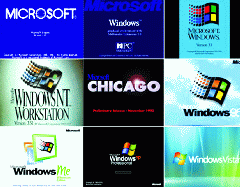Archives
The EVOLUTION of Microsoft Windows operating systems
1995 - Windows 95 the Taskbar was introduced for the first time in Windows 95, with open window buttons, a clock, a notification area and the Start button. My Computer and Recycle Bin icons made their first appearance.
1996 - Windows NT 4.0 was focused more on the business market. It was famed for its stability and was able to close down applications that had stalled without the whole Operating System (OS) crashing.
1998 - Windows 98 was on sale for less than 12 months before a wide-ranging update for the OS was issued.
1999 - Windows 98SE the updated version of Windows 98, the SE stood for Second Edition. It fixed many bugs in the original and is considered as one of the most stable Windows OS.
 2000 - Windows 2000 was aimed more at the business market though it ended up on many home computers as well. It was initially intended to replace both Windows NT 4.0 and 98, but Microsoft changed its mind after the release of Windows 98SE.
2000 - Windows 2000 was aimed more at the business market though it ended up on many home computers as well. It was initially intended to replace both Windows NT 4.0 and 98, but Microsoft changed its mind after the release of Windows 98SE.
2000 - Windows Millennium Edition (ME, pronounced ‘me’) was the successor to Windows 98 and was aimed for home users, with several entertainment-based features. However, it was panned by reviewers and customers because it was notoriously unstable
2001 - Windows XP offered Home and Professional versions. It stayed as Microsoft’s front-line OS product for the best part of six years and had sold 400 million copies by October 2006.
2007 - Windows Vista is the most popular version of Windows to date. However one main criticisms was the number of warning prompts the User Account Control (UAC) showed to users.
2009 - Windows 7 launched on 22 October 2009, brings features such as support for touch screen devices and an easier home-networking set-up. According to Microsoft, Windows 7 is faster than its predecessor, but will run on lower-spec PCs.

